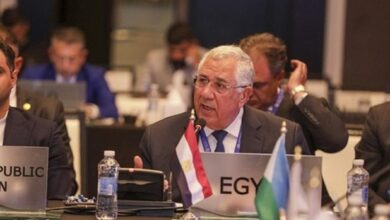Despite its difficult political circumstances, Lebanese resistance movement Hezbollah is unlikely to hit the streets of Beirut en masse as it did in mid-2008, say analysts.
The formation of the current Lebanese government in late 2009 occurred after five months of institutional crisis. But with the 12 January withdrawal of Hezbollah ministers from the government, Lebanon’s stability may be at risk once again.
Everybody remembers the events of May 2008, when the Doha agreement had been reached following a period of mounting tension and sectarian violence. At the time, Hezbollah did not hesitate to make a show of strength in the capital to remind all parties exactly who had the upper hand.
Experts and sources contacted by Al Masry Al Youm, however, say that Hezbollah is most likely not willing to repeat this scenario.
Since the summer, domestic tensions in Lebanon have been mounting, especially over the UN-backed Special Tribunal for Lebanon (STL), tasked with investigating the 2005 assassination of Lebanese premier Rafik Hariri–and its anticipated indictments of Hezbollah members.
Hezbollah chief Hassan Nasrallah has urged Saad Hariri, Lebanese PM and son of the slain premier, to halt all government support for the STL. Syria and Saudi Arabia, meanwhile, have engaged in mediation efforts aimed at finding a workable solution.
For Peter Harling, project director of the International Crisis Group’s Middle East Program, Hezbollah’s ministerial resignations were “driven by the same objective, namely, pressuring the government to disavow the tribunal.” He added: “Hezbollah has been frustrated for several weeks by the absence of progress towards a workable compromise on the STL.”
The ministerial resignations reflect a strategy by Hezbollah aimed at avoiding the devastating effects of the anticipated indictments, explained a well-informed source in Lebanon.
“The indictment will have a major impact on the image of Hezbollah as a party that is honorable, fighting for the liberation of the land and the Palestinian cause… it will tarnish the reputation of the Hezbollah party… maybe place it on the Europeans’ list of terrorist organizations,” the source said.
The same source went on to opine that “this move by Hezbollah is a carefully planned one because, by resigning before the indictment, there is no cabinet, meaning that the cabinet cannot take any official decisions. So if the cabinet tries to deal with the international tribunal, this would be viewed as illegitimate and unconstitutional.”
“The moment of truth is close and Hezbollah, at a minimum, wants to undermine the credibility and legitimacy of the current government,” said Harling.
He went on to warn against expectations of a worst-case scenario. “I don’t think this decision will automatically spark domestic violence on a broad scale, although incidents will probably occur,” he said. “Negotiations seem to have been started, but they may drag on until the indictment.”
The source in Lebanon, without dismissing the possibility of unrest, affirmed that Hezbollah’s strategy was political. “They would lose more than they would have to gain,” he said, asserting that Hezbollah was acting “carefully.”
“In the street, the Shiites will tell you that they are ready to support the opposition and take to the streets again–but you feel they are less aggressive now if you compare the situation to other crises that have occurred in the past,” he added. “Until now, there has been no action on the street from Hezbollah.”
Hezbollah’s intentions can be gauged by its recent activity in South Lebanon. While the group had some disputes with UN forces in Lebanon–and Israel–last summer, calm now prevails in southern Lebanon. In fact, said the source, the situation there is less precarious than it was only a few months ago.
“I think Hezbollah is at the height of its power,” the source added, in an explanation as to why the group was not eager to act recklessly. “Hezbollah and the opposition have promised not to use force this time, but only peaceful and constitutional methods,” he said.
Yet things can change dramatically in a short span of time, observers note. “You might have a third party that will try to exploit the opportunity to create more tension,” said the source.
One crucial factor for the future of Lebanon is the course of the international tribunal. “Decisions in the Hague are inevitably intertwined with events occurring in Lebanon, if only because they are interpreted politically,” said Harling. “Nevertheless, the STL has a rationale of its own and its interests lie in demonstrating ostensible impartiality to strengthen its credibility. The tribunal is expected to follow and confine itself to judiciary logic.”
In addition, events in Lebanon reflect a regional power struggle. Commentator Zvi Bar’el, in Israeli daily Haaretz, wrote that “Hezbollah's collective resignation yesterday was intended to show Syria the limitations of its influence on the group and to tell Damascus that if it wants to show Washington it can preserve stability in Lebanon, Hezbollah and Iran will have the last word.”
According to Harling, although Damascus had tried to negotiate a peaceful arrangement between Hariri and Hezbollah regarding the STL, its politics have not been significantly affected by the recent withdrawal of the ministers. “It is unclear that the Syrians are trying to drive events in Lebanon, rather than simply supporting decisions made by their allies,” he said. “Whether events veer towards compromise or confrontation, the balance of power is such that the outcome has every chance of being in their favor.”
The Lebanon-based source added that the ministerial resignations were even beneficial to Damascus, as Washington’s new ambassador to Syria is due to arrive in Syria on 16 January, while Israel recently showed its determination to intensify military pressure on Palestinian resistance faction Hamas in Gaza. It can be read as a “strategy of diversion” by Damascus, which currently shelters Hamas political leader Khaled Meshaal.
In Egypt, reactions have been generally limited to official declarations. Cairo, fearing the influence of Iran and its allies in the Middle East, is supporting Hariri, but “it has limited means to tilt the balance of power except by political support,” said Harling. “Naturally, Cairo can go further–except discretely,” he added.
The source pointed to the welter of rumors about Egyptian support given to certain Sunni factions, especially in Tripoli. “It seems the Egyptian secret services are very active in Lebanon” he said.
“Lebanon is a place of compromise; it has always been like this. Crises in this country are always settled by compromise, until the next crisis erupts,” said the source. “This is a game of power politics.”




